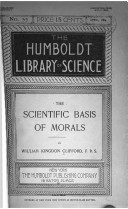The Danger of Believing Unproven Things
... If I let myself believe anything on insufficient evidence, there may be no great harm done by the mere belief; it may be true after all, or I may never have occasion to exhibit it in outward acts. But I cannot help doing this great wrong towards Man, that I make myself credulous. The danger to society is not merely that it should believe wrong things, though that is great enough; but that it should become credulous, and lose the habit of testing things and inquiring into them; for then it must sink back into savagery.
Notes:
Is that we fall into the habit of believing these things, the empirical knowledge we have crumbles, and we return to savagery.
Folksonomies: society empiricism morals
Taxonomies:
/science (0.712372)
/society (0.203694)
/family and parenting/children (0.146266)
Keywords:
Believing Unproven Things (0.982167 (negative:-0.588049)), empirical knowledge (0.744308 (negative:-0.223572)), insufficient evidence (0.735670 (negative:-0.473227)), mere belief (0.718315 (negative:-0.339614)), great harm (0.632366 (negative:-0.339614)), wrong things (0.611732 (negative:-0.400082)), danger (0.518136 (negative:-0.494065)), habit (0.509369 (negative:-0.543268)), crumbles (0.396380 (negative:-0.223572)), occasion (0.324007 (negative:-0.214044)), Man (0.301413 (negative:-0.605758)), society (0.296287 (negative:-0.400082))
Concepts:
Science (0.884808): dbpedia | freebase | opencyc
UK Singles Chart number-one singles (0.807498): dbpedia
English-language films (0.797376): dbpedia
Evidence law (0.747725): dbpedia
Believe (0.747600): dbpedia





